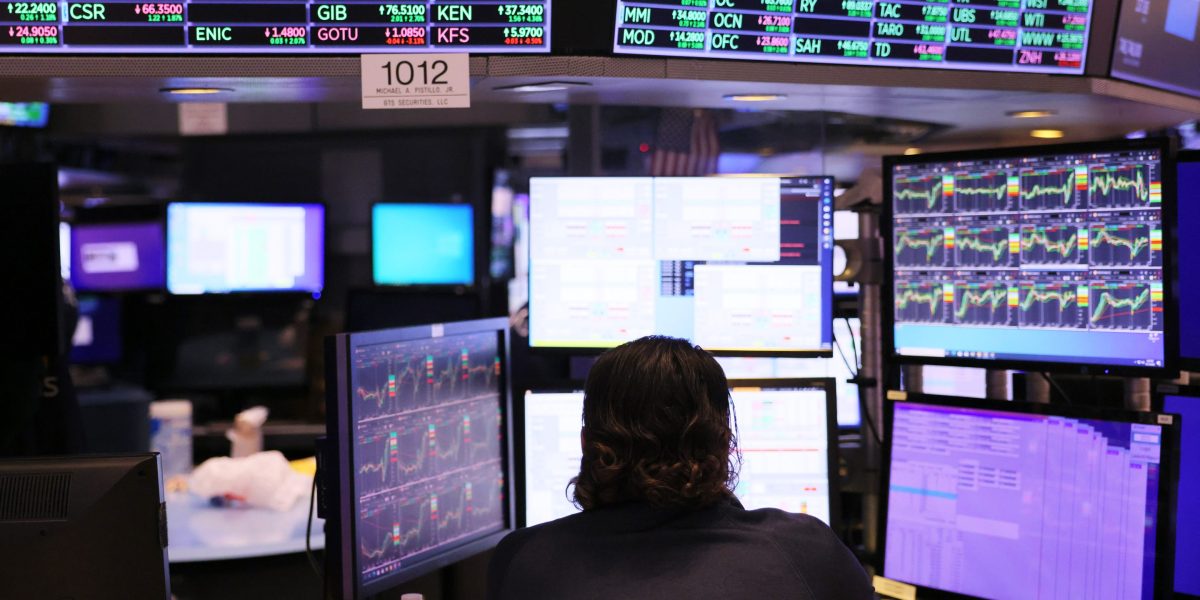How CEOs can stay clear-eyed during stock market AI selloff

Good morning. Is the AI bubble popping? The S&P 500 has fallen in each of the past four days, major investors like Peter Thiel have revealed they have unloaded their stakes in high-flyers like Nvidia, and even Alphabet CEO Sundar Pichai has acknowledged “there are elements of irrationality through a moment like this.” But all would be wise to remember that the AI bubble is a financial phenomenon, not a technological one. The assumption that they go together could be an expensive mistake.
We’ve seen it before. When the internet bubble popped in 2000—the S&P plunged 49% in 31 months—many people concluded, “You see? That internet thing was a big nothing.” Obviously they were wrong. The market had a seizure. Companies that were flimsily financed failed. But the technology continued to change the world.
Now AI, the next general-purpose technology after the internet, will transform the world even more than the internet did, regardless of the market’s mood. Business leaders must pull their eyes away from the sea of red flashing across Wall Street and stay focused on preparing their organizations for staggering changes. Here are three questions as thought starters, ranked at increasing levels of mind blowing:
–When will your company’s agentic AI disburse money all by itself? At Fortune’s latest Emerging CFO program last week, I asked three CFOs if they were letting AI do that already. Their answers ranged from “No” to “No!” But after thinking for a few moments, one of them said, “Within certain guardrails I think absolutely you’ll get there, especially on low-dollar, low-risk transactional type of things. I can certainly see that being a case.” Rethinking the impossible will have to become a habit.
–Are you prepared for AGI? Artificial general intelligence has no strict definition, but in the AI world it usually means intelligence greater than human intelligence. Experts generally estimate AGI will be achieved sometime between the late 2020s and early 2030s. As that day approaches, leaders face a challenge unique in history: how to run an organization in a world where humans are, as AI godfather Geoffrey Hinton has said, the second-smartest species on the planet.
–When will the one-person, billion-dollar company arrive? OpenAI CEO Sam Altman and his tech CEO friends started a betting pool on the answer to that question almost two years ago, as mentioned in last Friday’s note. For them, it’s a question of when, not if. How would you bet? How would your organization fare against a competitor with just a CEO and a whole lot of AI?
So much of this sounds crazy, but it must be confronted. The bottom line is there will be winners and losers. As always with a new general-purpose technology, fearless imagination will win.—Geoff Colvin
Contact CEO Daily via Diane Brady at diane.brady@fortune.com
Top news
Trump fetes Saudi’s MBS
U.S. President Donald Trump hosted Saudi Crown Prince Mohammed bin Salman on Tuesday, calling him a “really good friend” and brushing off questions about a U.S. intelligence report that found MBS had ordered the murder of a journalist. (MBS has denied involvement.) The U.S. will sell F-35 fighter jets to Saudi Arabia, and the Trump administration is seeking billions in U.S. investment from the kingdom.
Markets await Nvidia earnings
Wall Street is eagerly awaiting Nvidia’s earnings today; the chipmaker’s results after the closing bell will shed light on the underlying economics of the AI boom amid the market selloff fueled by AI bubble fears. In a new feature, Fortune’s Jim Edwards digs into why AI revenue needs to catch up with AI spending or risk an even bigger fallout in U.S. stocks whose yearly gains are heavily concentrated among the AI-focused Magnificent Seven.
Meta’s antitrust win
Meta averted an existential crisis on Tuesday when a U.S. district court judge ruled it did not have a monopoly in social networking and therefore does not have to sell off Instagram and Whatsapp.
FTSE 100 nears a milestone
Even with the recent selloff, the U.K.’s benchmark FTSE 100 is close to surpassing 10,000 points for the first time. Stocks of mining giants and utilities have boosted the index 17% year-to-date, outpacing the S&P 500, the Nasdaq Composite, and the Dow Jones Industrial Average.
China’s patent machine
Tsinghua University has long been China’s leading science and technology school, and it’s now emerging as the world’s leading AI institution. It’s published more AI research papers among the 100 most-cited than any other university, Bloomberg reports, and has secured more patents than Harvard, MIT, Stanford, and Princeton combined.
Kraken raises $200 million
Crypto exchange Kraken raised $200 million in funding from Citadel Securities, Fortune exclusively reported, affording Kraken a $20 billion valuation. The cash injection comes just two months after the company raised a $600 million round from a group of Wall Street and Silicon Valley figureheads.
The markets
S&P 500 futures are up 0.29% this morning. The last session closed down 0.83%. STOXX Europe 600 was up 0.06% in early trading. The U.K.’s FTSE 100 was up 0.15% in early trading. Japan’s Nikkei 225 was down 0.34%. China’s CSI 300 was up 0.44%. The South Korea KOSPI was down 0.61%. India’s NIFTY 50 is up 0.55%. Bitcoin was up at $95K.
Around the watercooler
‘Bond King’ Jeffrey Gundlach warns of the next financial crisis: ‘It has the same trappings as subprime mortgage repackaging in 2006’ by Nick Lichtenberg
Half of millennial and Gen Z couples pick engagement rings with lab-grown diamonds— ‘well beyond what the mining industry had expected,’ McKinsey says by Sydney Lake
Billionaire tech founder Joe Liemandt says getting an MBA isn’t worth it and you don’t learn a ‘fraction’ of what you would as an entrepreneur by Sydney Lake
How America fell behind in the rare-earth race—and how it hopes to come back by Eva Roytburg
CEO Daily is compiled and edited by Joey Abrams and Claire Zillman.